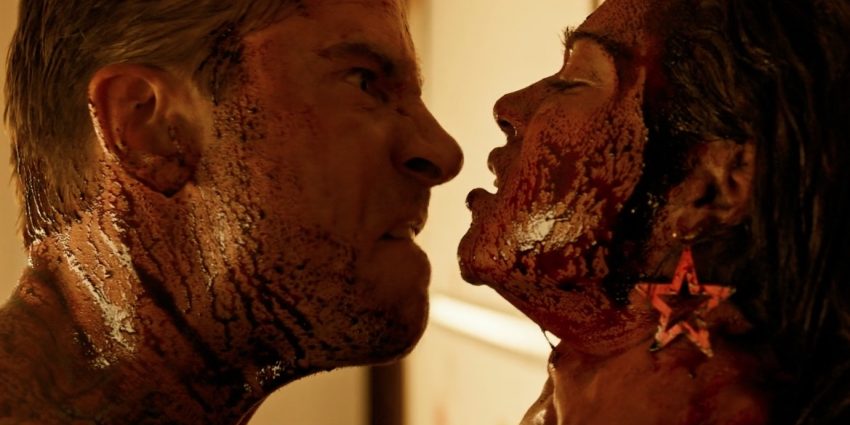Review: Revenge (2018)
By Peter Foy
May 21, 2018
In the months after the #MeToo movement—the social media campaign that outed a small legion of powerful men across the world of politics and media—the sense of shock is still lingering, but there’s also a gestation of thought that’s arisen: how will entertainment itself commentate on these accusations? There have already been high-profile announcements, including an upcoming play by David Mamet based on Harvey Weinstein, and crime fiction is always riveting as social commentary—not only does it address the ugliness of the world but it acts as rousing escapism because of it. For that reason, the debut film from French filmmaker Coralie Fargeat, Revenge, comes off as a bit more prescient than it would have a few years ago, and it’s exactly the type of rock-salt blast to the face for which the male gaze has been long overdue.
Essentially an update of rape-revenge films from the ‘70s (e.g., I Spit on Your Grave, Last House on the Left), Revenge mimics those films by being heavy on excess and light on plot. Following Jen, a 20-something American girl (Matilda Lutz) and the mistress of French millionaire Richard (Kevin Janssesns), we see her and her lover arrive in an undisclosed location in the midst of a vast desert. Staying at Richard’s private home, the two engage in sex and drinking until Richard’s two hunting buddies, Stanley (Vincent Colombe) and Dimitri (Guillaume Bouchède), show up and things take a turn for the lurid. Stanley rapes Jen, and when she approaches Richard in tears saying that she wants to leave, he shows his true colors and beats her. The scene climaxes when Richard pushes her off a cliff and leaves her for dead as he and his degenerate friends retire for the evening, vowing to find her body the following day. Jen, however, inexplicably survives both her fall and her impalement on a stake and now has to struggle against the three men that will stop at nothing to have her killed.
Revenge certainly isn’t going to win points for originality, but it isn’t trying to. Coralie Fargeat is trying to make a film that’s thrilling, empowering, and easy-on-the-eyes despite its perversity. Earlier exploitation films suffered from minuscule budgets and amateurish filmmaking, which made for viewing experiences that were as ugly as the material they presented. Revenge is the inverse of this: while it still subjects viewers to scenes of rape and carnage, those scenes are captured beautifully. Fargeat shows utmost craft with her film, using lush lighting and extreme close-up shots that render her colorful palette of male ugliness. These shots are often on the nose (e.g., a super-gross image of Dimitri eating junk food; Jen discovering that she’s inadvertently tattooed an eagle across her stomach), but they fit with the film’s slightly campy and self-aware presence.

It’s also clear that Fargeat isn’t trying to make an overt statement with Revenge, which is why she keeps the characterizations a bit skeletal. We don’t know too much about Jen, other than that she appears to be very much a millennial (she dreams of going to LA to be a star and often has her headphones in), and her tormentors are even less established. So what’s impressive about Revenge is how Fargeat is able to make us care about her character, achieving this by simply showing her get brutalized and then make a most-transformative recovery. In a pivotal sequence where Jen has to improvise while healing her wound, Fargeat gives us a visceral sequence that’s trippy and invigorating in equal measures. The young Italian actress Matilda Lutz truly had to prepare for this role, as we see Jen’s buxom babe turn into a Red Sonja-esque she-warrior (complete with a two-piece!), and there are great rewards to be seen in her kickass quest for retribution.
Yet, once again, Fargeat doesn’t go the easy route in bestowing her thrills, and the buildup that Revenge elicits is some of the most finely tuned you’re likely to find in a thriller this year. Jen does indeed lay waste to all three of her attackers (hardly a spoiler, right?), but what’s more surprising is how the scenes play out. Fargeat takes her time with the violence—at times letting the gore flow a bit longer than one would expect (one lengthy scene involving a character getting a piece of glass lodged in their foot does the tricky feat of being both disturbing and oddly comic)—and is always exemplary with the filmmaking. The film’s climax makes strategic use of long shots and brisk editing, and I’m already thinking that it will go down as the year’s best action set piece.
Revenge isn’t a film for everyone. It’s unabashedly gory, and those that value more subtle conjectures in cinema won’t be finding this particularly rich. What it is, however, is a well-meaning and unpretentious throwback film that marks the debut for a remarkable new filmmaking talent. Similar to what fellow French filmmaker Julia Ducournau did in her debut film, Raw, Fargeat has applied arthouse features to a well-worn genre format and turned out a piece that’s far deeper than its blood-soaked surface might suggest. Here’s hoping that her craft will only evolve from here, because if rape-revenge films are more relevant than ever right now, then female directors are even more so.
Comments are closed.

This looks really cool.
I read this article completely about the difference of most up-to-date and previous technologies, it’s remarkable article.